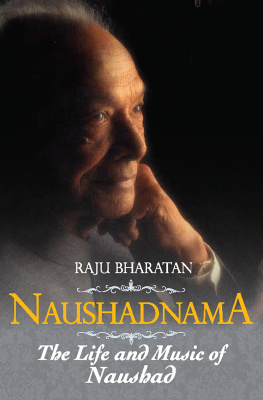Hay House Publishers (India) Pvt. Ltd.
Muskaan Complex, Plot No.3, B-2 Vasant Kunj, New Delhi-110 070, India
Hay House Inc., PO Box 5100, Carlsbad, CA 92018-5100, USA
Hay House UK, Ltd., Astley House, 33 Notting Hill Gate, London W11 3JQ, UK
Hay House Australia Pty Ltd., 18/36 Ralph St., Alexandria NSW 2015, Australia
Hay House SA (Pty) Ltd., PO Box 990, Witkoppen 2068, South Africa
Hay House Publishing, Ltd., 17/F, One Hysan Ave., Causeway Bay, Hong Kong
Raincoast, 9050 Shaughnessy St., Vancouver, BC V6P 6E5, Canada
Email: contact@hayhouse.co.in
www.hayhouse.co.in
Copyright Raju Bharatan 2013
The moral right of the author has been asserted.
The views and opinions expressed in this book are the authors own and the facts are as reported by him, which have been verified to the extent possible, and the publishers are not in any way liable for the same.
Cover photograph: Courtesy: The Gautam Rajadhyaksha collection
All rights reserved. No part of this book may be reproduced by any mechanical, photographic, or electronic process, or in the form of a phonographic recording; nor may it be stored in a retrieval system, transmitted or otherwise be copied for public or private use other than for fair use as brief quotations embodied in articles and reviews, without prior written permission of the publisher.
ISBN 978-93-81431-93-1
Designed and typeset at Hay House India
Printed and bound at
Saurabh Printers, New Delhi
To
my wife, the late Girija Rajendran,
and
also to
Shilpa, Sriganesh,
Sucharita and Sachin
RENOWNED FOR HIS PROLIFIC OUTPUT AS A JOURNALIST, WRITER AND translator, nonagenarian Khushwant Singh was on song as he rhapsodized: Urdu is the most musical of all languages in the world. Likewise, the creator of the most beautiful music in the world did Naushad Ali sound. If he sounded that, it was because Urdu was the leitmotif of his music. Music by Naushad attuned to Shakeel Badayunized poetry it had to be. Or was it Shakeel poetry attuned to Naushad music? You could never quite find out and therein lay Naushads hold on the public imagination.
You could never find out because Naushad had achieved the same entrancing results teaming with Shakeel Badayuni (on, say, Babul, 1950) as he had while pairing with Majrooh Sultanpuri (on Andaz, 1949). So lyrical was Naushads equation with Shakeel that he could get this Urdu aesthete to thematize no less evocatively, in Hindi, for Mohammed Rafi in Baiju Bawra (1952). Short point: Naushad had the kind of poetic control over his musicality that no other composer did.
This book is as much about the aura of his universal music as it is about the texture of the Urdu poetry going with it. Via the elegant variation that he brought to his compositions, Naushad all but turned Urdu into the lingua franca of song-loving India. His sense of commitment as a composer, his philosophy on life, are summed up succinctly by this musicians musician as: Kyun na kashti uski pahunche kinare Khuda hi jis ka nakhuda ho? (Why would that boat not reach the shore safely whose boatman is none other than God Himself?)
No one more influenced me in rounding my musical outlook than did Naushad. With due deference, it was I who wrote the first-ever film music column in India as On Record in Filmfare. As I wondered how to get going, willy-nilly had I to pick out the music of Naushad as my punchline to accomplish a straight breakthrough (Maestro Minus the Midas Touch, Filmfare, 5 August 1966). That column my maiden in the era when melody was still queen had me asserting: Quality is not everything in the sphere of film music: it has to be matched by novelty.
On this point, Naushad took me up during August 1966 itself at a South Bombay function in the Cricket Club of India, as he queried: So the lad who first met up with me [late in 1948] seeking to be enlightened on a Mela film musical point is now sitting in judgment on my scoring, is he? In the next moment, typically, he held out his hand, expressing his personal joy at someone whom he knew so well having landed such a coveted assignment as that of the Filmfare music critic.
After all, in the 10 formative years preceding that prized column happening as I began writing on cinesangeet by even ghosting Filmfare articles for our top composers I had absorbed my first real lessons in classical music from Naushad. To call him a friend would be to insult his memory. He was at all times like a beacon to me. His singular trait he never protested if I critiqued him. In the case of anything that you write on me, he tellingly remarked, I get an instant feedback. And that is what truly counts in my estimate. My music must be noticed. After that, how you perceive it is your privilege.
From being merely acquainted with him as my idol through the first five years (194954), I got to know Naushad fairly well by end-1955. I came to tune with him even better as I visited his West Bandra Ashiana music room any number of times. These were my crucial years in the audio world, as I awakened to the sound of classical film music under his melodic guidance.
Soon I divined that, without ever saying so, Naushad had begun making my music listening classically oriented. In this sense, he was my mentor. The fact that, even before we embarked upon such a journey, he was my favourite music director helped. Yet Naushad as a communicator demanded unswerving attention. He got it as he cast a classical spell all his own, on the piano, in re-playing his finest tunes with verbal notes as accompaniment for me to jot down.
Naushad had expected me to write his biography while he was living. (He passed away on 5 May 2006.) I am coming around to doing Naushadnama only now because it took me all of 50 years during which I came to know him well to fathom the full strength of his music. As I started work on this book, the idea was to go beyond anything written on Naushad so far. No easy job, considering that Naushad remains our most written-about music maker. Only as I gathered momentum did I feel convinced that I really was adding to the sum total of Naushadian lore.
For Naushad was something more than his music. His personality presented a study in career management. He worked like a beaver to sustain the status that he had attained as the number one music director in our films. Such a meteoric rise had to be backed by solid all-round effort to stay at the summit. Here Naushad never once relaxed his grip. He worked with the same assiduity on his career as he did on his music.
It is this little-known Naushad attribute of always being one-up on his rivals even while doing his job with total sincerity that I have endeavoured, relevantly, to underscore. In the process, I have been careful to keep in sight the fact that Naushad never lost the human touch. He brought to the art and craft of music making an integrity balanced by a magnanimity deftly buttressed by his eloquence as an Urdu orator. Go deep down into sangeetam-aware South India and you will find that the music enthusiasts there have not only heard of Naushad but have savoured his tunes and regard him highly. The reach of his music was phenomenal. Where our assembly-line music directors manufactured eminently predictable ditties for the hit parade, he scored for the aficionado. Yet never lost his feel for the man in the street since that is where he had begun his career. Everything about Naushad and his melodizing was so finely tempered, his scoring, at all times, being distinguished by the imprint of individuality.
During my 40 years in The Times Group, comprehensively did I write on his music. In fact, on a six-page career review that I did, I even invited his daughter, Fehmida Naushad, to pen two additional pages in a personalized vein. Prefixing my own comments to her observations, I have extracted select portions from Fehmidas piece something that gives me the opportunity to thank The Times Group for its role in shaping my career. It was this premier groups
Next page









